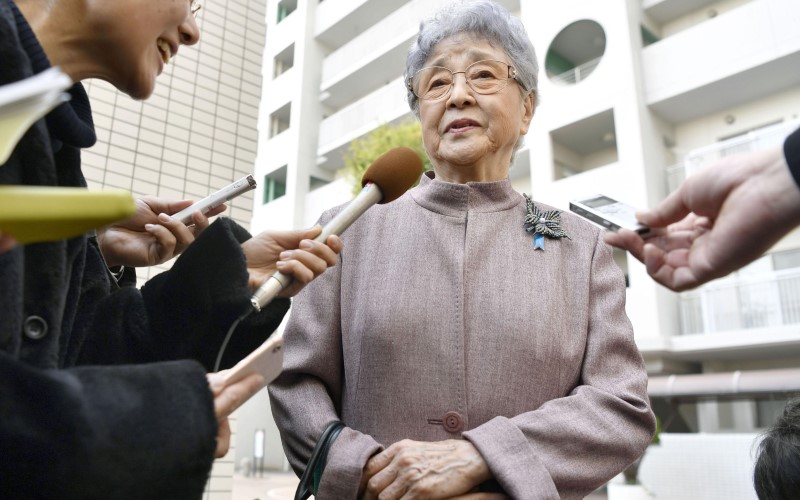
Nearly two decades after North Korea retuned five people it abducted to their home country of Japan, efforts to silence those who challenge the government line continue.
Japan does not have to speak forever with only one voice. For a remarkable moment in 2002 Tokyo’s moderates were poised to have Japan move to policies that would have ended the years of hostility to North Korea and Pyongyang’s push to acquire nuclear weapons.
The move was only killed by the hardliners using the artificial abduction issue (the claim North Korea was still holding abducted Japanese citizens).
But after almost two decades that issue must be close to its expiry date. Are we destined forever to be dragged along by Canberra’s Quad partner in Tokyo and our own hardliners determined to continue to see or create Asian enemies? Some background is needed.
In the late nineties officials in Japan’s Foreign Ministry (MOFA) set out to persuade Pyongyang to admit to having abducted Japanese citizens during the seventies and eighties. Pyongyang eventually confessed to abducting 13 people of whom eight had died for varied reasons. The remaining five could return to Japan.
Japan was elated. The release of the five was to be marked by a visit to Pyongyang by then prime minister, Junichiro Koizumi, and the signing of a Pyongyang Declaration in which:
- Japan admitted it “had caused tremendous damage and suffering to the people of Korea through its past colonial rule, and expressed deep remorse and heartfelt apology.”
- North Korea apologised for the abductions saying in effect they were due to the abnormal state of relations between the two countries at the time.
- Diplomatic relations would be normalised and Japan would provide a variety of economic aid.
- Both would co-operate “to maintain and strengthen the peace and stability of North East Asia”.
And most importantly:
- North Korea would “maintain the moratorium on missile launching in and after 2003”.
It was a remarkable document which, if adhered to, would have ended the decades of Cold War in north Asia. But the five abductees had barely arrived in Japan when the conservative counter-attack began.
First move was to have Japan renege on a promise to let the abductees return for visits to the families they had created while in North Korea. Tokyo insisted the families had to come to Japan.
Then in 2004, Japan’s then deputy chief cabinet secretary and later prime minister, Shinzo Abe, dramatically announced he had evidence North Korea could also be holding many of the hundreds of Japanese who had disappeared in previous years (one of them was found dead under a boat not far from where I live in Japan, but whatever).
Meanwhile Tokyo was creating a mini-bureaucracy to handle what it called the abduction issue. It claimed officially that North Korea was still holding at least 17 abductees, with one of the abductees, Megumi Yokota, abducted at age 13, made into the poster-woman for the issue.
Films, comic magazines, websites, songs, monuments were created across Japan to commemorate her alleged existence and call for her return to Japan. Delegations were sent abroad to remind us all of the Megumi and other abduction tragedies and the need to keep the pressure on North Korea.
North Korea could do little more than continue to insist Megumi had died in 1994 after having a child and a failed marriage. In 2004 it sent her cremated bones to Tokyo as proof.
Abe doubled down. A government DNA tester had proved the bones did not belong to Megumi, he said. But the bones would not be returned to North Korea or anywhere else for future testing. And the government tester had disappeared for some reason.
At this point the two main Western scientific journals, Nature and Science, weighed in saying DNA testing of cremated bones was scientifically impossible. (I checked this with the head of Japan’s DNA research centre near Tokyo and got the same answer.)
I have continued my research. In 2015 I had the chance to be seated next to Sakie Yokota, Megumi’s mother, at one of the many meetings and conferences calling for abductee return.
She and her husband had in 2014 finally been allowed by Tokyo to visit Megumi’s daughter, Kim Eun Gyong in a third country, Mongolia. I asked her why the press reports of the historic meeting carried no mention of her trying to find the fate of Megumi. She replied cryptically that she saw her main task was to support the other parents in their search for lost children.
Efforts to silence critics of the abductee story continue. In 2009 an influential commentator, Tahara Soichiro, said in his regular TV program that a MOFA source had told him that they knew at least two alleged abductees had already died.
For his trouble he was to be roundly condemned by the government, sued by one of the alleged abductee relatives for mental distress, fined, made to apologise and promise not to repeat his error again.
Yours truly was to suffer too. Labelled in 2015 as an abduction denier by a commentator for the hard-right Sankei Shimbun newspaper, letters of protest poured into the university where I worked, speech and commentary invitations dried up overnight, an appointment as outside director of Mitsu & Co, was abruptly cancelled.
It was an alarming example of how easily opinion in Japan can be mobilised against imagined enemies.
Are things changing? A member of Japan’s main opposition Constitutional Democratic Party, Yukio Ubukata, said at a meeting last month he had reason to believe Megumi Yokota was no longer alive.
But immediately the powerful abductee support groups subsidised by the government swung into action with an October 11 statement criticising his remarks. He has now dutifully apologised. No one in the media has emerged to support him.
But it cannot stay like this forever.
The Japanese people are not stupid. With two changes of government and some weakening of the Abe hardliner influence there must be some easing of the abductee myth. When that happens will someone emerge to admit how and why it all started?
And will that remarkable 2002 declaration be remembered for what it was?




